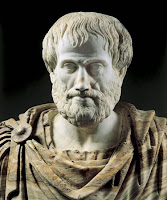Historically, the link between public relations and the political sphere is very distinct but the term political public relations is rarely used. Public relations and politics have been two firmly entwined concepts since the beginning of recorded history.

Edward Bernays

Aristotle
For evidence from ancient times, we can look at Aristotle and his schools of rhetoric thoughts that taught the art of persuasive communication. Or more so in more recent times, the work of the man commonly thought of as 'the father of modern day public relations', Edward Bernays, and his belief that PR is an art applied to a science. Both these school of thoughts provide a clear connection between the two.This post, based on our lecture on contemporary theories and issues in PR, looks into the concept of political PR within a campaigning, representative and governing context.
Public Relations and politics have a lot in common. Not least is the fact that both PR practitioners and politicians are frequently criticised by people. But on a more serious note, public relations plays a role in politics and government policy by influencing public opinion to support a certain candidate or piece of legislation.
Political Public Relations < Political Communication
PR is a widely recognised term, and political actors rely on communication to reach their key audiences, yet the term political public relations is rarely used, as commentators tend to refer to therm 'political communication' (Chaffee 1975, Franklin 1994, McNair 1995, Negrine 1996).
How PR plays 'Politics'
PR plays a great role in politics, in ways more than one:
- The PR function of publicity is a great tool of gaining awareness for candidates and cause. Whether through mass media exposure, special events or targeted direct communication, making candidates' names known to voters is a basic function of political PR. Candidates can't win if voters don't know their names.
- PR's role in providing voters with enough information to develop an understanding of candidates' position is another role of PR closely tied to politics. Knowing who's running is important, but once they have an awareness of who's in the contest, understanding where each candidate stands on the issues becomes a priority.
- Due to modern-day public relations, another dimension comes into play, though- one that moves public relations beyond publicity and the use of one-way messages and toward two-way communication.At the highest level, this two-way approach allows for both persuasion of the public and modification of the politician with an eye to bringing both to that most valuable of outcomes- mutually beneficial relationships.
PR techniques in Politics
Until very recently political communications was dominated by primarily one PR technique: media relations. From the early1960's through to the early 1990s research focused primarily on the impact of mass communication, especially television. As a result, political communication stressed the impact of journalists and political actors on shaping public opinion.
However, since the mid-90's the dominance of mass communications has been challenged by three interrelated developments. Firstly, the introduction of the permanent campaign which has blurred the difference between campaigning and governing so that politicians seek to dominate the agenda every single day. Secondly, there has been an increased professionalisation of communication with public relations and marketing professionals transferring their skills to the political arena. Thirdly, the growing importance of new communications technology, namely new media, especially the internet, has encouraged political actors to use a much wider range of PR tools. Under such developments, political communicators do not rely on one dominant channel to reach their target audiences.
Here's a look at how politicians have campaigned in the past:



To cut the long story short, four main activities that stand out in political PR are:
- Media management (controlling messages)
- Image management (protecting an identity or brand, relationship building etc)
- Internal communication (engaging people within the party and controlling opinionated messages)
- Information management (gate-keeping)


U.S. President-elect Barack Obama showed other politicians how to harness the power of the Web in 2008, bringing political campaigns kicking and screaming into the 21st century. Obama went beyond the static web pages of most past campaigns, by tapping the power of web 2.0 tools including Facebook, YouTube, Blogs and discussion boards, to create an engaged conversation with potential voters.

Ofcourse, Obama was not the first presidential candidate to raise a million dollars online (McCain '00), nor was he the first to use the internet grass-roots efforts to moblize online supporters to meet up in their local communities (Dean '04). However, McCain failed to convert his online donors into votes and Dean failed to channel the online fervor into effective ground support. Obama was the first to do both, by weaving technology and the Internet into the fabric of his campaign.
Lessons from Obama's Social Media Campaign and his Social Media kit can be viewed by clicking here.

Political PR is essentially persuasive as it represents an interest and requires representative democracy were different competing interests can be heard. Although political PR may often be shouted in a loud voice, it should utilize a range of both 'loud' and 'soft' PR encourages using both direct and indirect communication channels. Political PR encourages a rich interaction at a range of different levels between those active, interested or even uninterested in the political process and political discourse.
A case study on the Barack Obama Strategy can be viewed below:
My friend mentioned to me your blog, so I thought I’d read it for myself. Very interesting insights, will be back for more!
ReplyDeletePublic Relations
This comment has been removed by the author.
ReplyDeleten order to rank your website on Google you will need something called a backlink. A backlink is another word for a hypertext link. off page seo
ReplyDelete